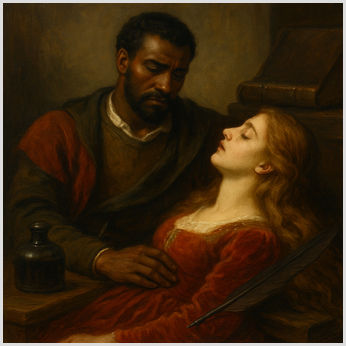Othello, also known as The Tragedy of Othello and the Moor of Venice, is a tragedy written by Shakespeare around the year 1603. It follows the protagonist Othello, who is a military commander, as he is manipulated and deceived by his subordinate, Iago. The play is set in Venice and Cyprus. It is considered one of Shakespeare's greatest works.
The play explores intense emotions and complex relationships. Numerous themes run through the play and influence the choices made by characters. This includes the theme of jealousy, manipulation, race and gender, which we will explore in this article. Key quotes and plot examples are provided for each theme. This article is suitable for GCSE English Literature revision, including memorising quotes for a closed-book exam or writing coursework.
If you need help studying this work, TeachTutti has qualified English Literature GCSE tutors who can provide in-person or online tuition to suit your needs.
Jealousy
Jealousy is perhaps the most dominant theme in Othello, leading to Othello's downfall as well as other characters. Shakespeare presents jealousy as dangerous and destructive, causing a devastating impact when it is left unchecked.
Othello is at first confident and deeply in love with his wife, Desdemona. Iago resents that Othello promoted the aristocrat Cassio to lieutenant over him. He convinces Othello of Desdemona's infidelity with Cassio by planting her handkerchief in Cassio's lodgings. He fully believes Iago's lies and Othello's jealousy cause him to smother Desdemona, even while she defends her husband by claiming she is killing herself and not him. She maintains her love to the end, and Othello tragically realises his mistake too late.
Iago encapsulates the destructive power of nature when he warns:
"O, beware, my lord, of jealousy; It is the green-eyed monster which doth mock The meat it feeds on." (Act 3, Scene 3)
Ironically, Iago's jealousy is also clear early in the play when he is bitter about Cassio's promotion over him. This motivates his actions and drives the events of the entire plot as Iago acts from behind the scenes.
Roderigo is a wealthy gentleman who has unrequited love for Desdemona. He is jealous when he discovers the secret marriage of Othello to Desdemona. It makes him vulnerable to Iago’s manipulations and eventually leads to his death.
Manipulation and trust
Iago is the master of puppets in the play and is responsible for manipulating many of the key characters. He is often considered one of Shakespeare’s most manipulative characters as he exploits those around him to pursue his own goals. He breaks the trust in the relationships of Othello and Desdemona, Cassio and Othello and even himself and Emilia.
He often presents himself as "honest Iago" during the play. Othello trusts him completely and describes him as someone "of exceeding honesty" (Act 3, Scene 3). This trust causes Othello to mistrust his wife and accept Iago’s lies as truth. We never see Iago directly accuse Desdemona of unfaithfulness. Instead, he suggests, asks questions and allows Othello to imagine the rest. This makes Othello believe he has discovered the affair himself.
Another example is when Iago arranges for Othello to overhear a conversation between himself and Cassio. This makes it appear that Cassio is laughing about his affair with Desdemona. In reality, they are discussing Cassio's relationship with the local courtesan, Bianca. However, Iago whispers her name so that Othello can't hear, and his imagination again does the rest:
"Now he tells how she plucked him to my chamber. O, I see that nose of yours, but not that dog I shall throw it to." (Act 4, Scene 1)
Othello's trust in Iago has completely replaced his trust in Desdemona. He believes that Cassio's laughter is proof of his guilt.
Iago's wife, Emilia, is also manipulated. She helps her husband in his schemes by giving him Desdemona’s handkerchief. Iago places this in Cassio's room as proof of her affair.
Race and prejudice
Othello is considered to be the Shakespearean play with the most explicit exploration of race and racism. Othello is a black man and is described as a Moorish military commander. He lives within a mainly white Venetian society, and he is presented as an outsider. He repeatedly suffers racial prejudice, despite his high military rank. This affects how others view him.
Racist language is directed towards Othello from the outset of the play. Iago and Roderigo call him "the Moor". Iago is particularly offensive when he talks to Desdemona's father, referring to Othello's skin colour and describing him in animalistic terms. It shows Iago leaning on racial fear to provoke Brabantio, using racism as a weapon:
"Even now, now, very now, an old black ram Is tupping your white ewe." (Act 1, Scene 1)
The protagonist is presented as composed and confident, ably handling interactions with other characters and giving orders as a military commander. However, the reminders of his outsider status wear on him. He begins to question if he is worthy of Desdemona, partly because of his race and background. This self-doubt and self-consciousness partly explain why he is so quick to believe Iago's lies. Othello begins to use the same language to describe himself, calling Desdemona's supposed betrayal a "foul charm" and describing himself as having a "sooty bosom". It shows how the prejudice surrounding him has seeped into his self-belief.
Desdemona does not show any prejudice towards Othello. She marries him for love and is open-minded and loyal. This makes her a highly unusual figure in a contemporary society full of narrow views. This reinforces the tragedy of her death at the hands of her husband.
Gender and power
Shakespeare explores the power imbalance between men and women in this play. There are three main female characters: Desdemona, Emilia and Bianca. Each character experiences different forms of repression and mistreatment. Only Bianca survives the events of the play.
Desdemona is presented as strong-willed. She chooses to marry Othello in secret. This is in direct defiance of her father, Brabantio, as his permission is not sought. This act underlines her independence and loyalty. Her voice is gradually silenced after her marriage, as Othello questions her faithfulness due to Iago's lies. She is blamed, shouted at, and ultimately smothered to death with a pillow by her husband.
Despite this, Desdemona continues to show loyalty. She even defends Othello as she dies in his hands. This level of obedience and forgiveness shows the social expectations placed on women at this time, even when they suffer from injustice:
"Nobody; I myself. Farewell. Commend me to my kind lord." (Act 5, Scene 2)
Emilia is Iago's wife. She is more outspoken, especially when she realises the true nature of her husband and his actions. She challenges Iago and the wider society in the following speech, arguing that women are not inferior to men and that they possess the same emotions and desires. Her courage in revealing the truth about the handkerchief leads to her death when Iago stabs her. This shows the dangers for women who speak out:
"Let husbands know Their wives have sense like them: they see and smell And have their palates both for sweet and sour." (Act 4, Scene 3)
Bianca is a courtesan. She is judged by her profession, just as one of the few characters who is honest and sincere. Her relationship with Cassio is not equal, as he uses her without showing Bianca any respect. She is an easy target when the plot to kill Cassio fails, and she is framed by Iago.
Conclusion - Themes in Othello
The key themes in Othello are timeless: jealousy, manipulation, race and gender. They shape the decisions of the characters and their relationships, ultimately leading to Othello's downfall and the deaths of Desdemona, Emilia and Roderigo. Othello then commits suicide when he realises the truth of Iago's lies.
Ultimately, jealousy drives Othello to murder. Iago's manipulation destroys trust between the characters. Othello is cast out from society due to prejudice, while gender inequality leaves women vulnerable and unheard. These are themes that remain true in today's world.
For further reading, SparkNotes has written an article on the historical context of Othello. You can also read literary criticism of Othello by Internet Shakespeare Editions.
To support your revision, TeachTutti has vetted GCSE English Literature tutors you can learn with. Tutors will tailor lessons to your needs. Every tutor has an enhanced DBS check.
This post was updated on 10 Jul, 2025.

